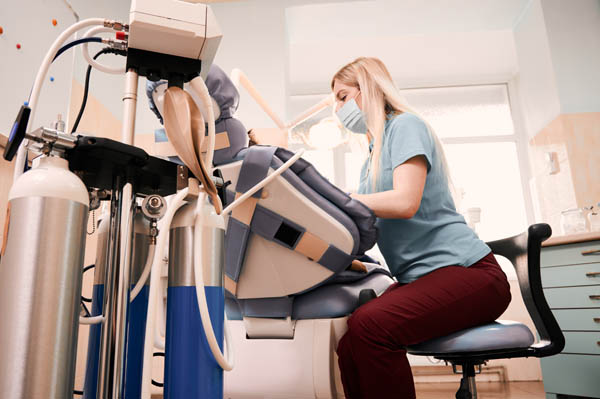Who is a Candidate for Sedation Dentistry?

Sedation dentistry helps individuals to overcome the fear of dentists. Dental anxiety affects many people and it often prevents them from getting treatments they need when problems develop in their mouths. However, most dental problems do not go away on their own. Treatment is needed to prevent the issue from getting worse, which can result in a lot of pain, money and time. Thankfully, sedation dentistry is a good solution. Individuals that do fear the dentist can undergo their procedure in a sedation dentistry setting to help offset these feelings, thus allowing for the appropriate oral health care.
How sedation dentistry helps with dental anxiety
The sedatives used in sedation dentistry help patients to feel relaxed and less anxious. The goal is to make the patient's experience as comfortable as possible so they no longer see going to the dentist as a scary thing that should be avoided.
People who do not have dental anxiety can also benefit from sedation dentistry if they struggle with back/neck pain during treatments or if they need to have excessive dental work done. Dental sedatives can reduce the number of trips a patient needs to make to the dentist since they can sit comfortably in a dentist's chair for longer. Dental sedatives can be used for most treatments ranging from the least invasive procedures like teeth whitening to surgical treatments like the installation of dental implants. Dental sedatives are commonly used to address issues like:
- Sore jaw muscles
- Dental phobias
- Low pain tolerance
- Overactive gag reflexes
- Patients who are unresponsive to local anesthetics
- Traumatic past experiences with a dentist
- Inability to stay still for prolonged periods
Type of sedatives used in dentistry
Dentists evaluate their patients before determining whether or not sedation dentistry is right for them. Factors that will be considered during the evaluation include: the patient's medical history, medications the patient is currently taking and their level of anxiety.
Based on their findings, the dentist might recommend sedation dentistry practices such as:
- Oral sedatives: A dentist might prescribe an oral sedative that the patient takes prior to their appointment. This helps to reduce their anxiety or fears about going to the dentist. Such medication impairs a person's ability to drive so transportation to and from the clinic should be arranged.
- Inhaled sedatives: Nitrous oxide is commonly used to keep patients relaxed during treatments. Also known as laughing gas, it is delivered with a facemask that is placed on the patient's jaw. It takes effects within minutes and it wears off just as fast.
- IV sedation: Medication that helps to keep patients relaxed can also be delivered intravenously. This type of sedation is typically reserved for patients who need a higher level of sedation. The dentist can adjust the quantity of medication being injected into the patient's veins as needed.
Give dental sedatives a try
Sedation dentistry can make dental appointments and procedures easier. Call or visit our Aurora clinic to set up an appointment with our dentist.
Request an appointment here: https://alamedadentalaurora.com or call Alameda Dental at (303) 343-7072 for an appointment in our Aurora office.
Check out what others are saying about our dental services on Yelp: Sedation Dentist in Aurora, CO.
Recent Posts
The local dental center might not be a favorite place to visit, but it is vital for maintaining oral health. If you have not had an appointment with a dentist for a while, you may have forgotten what takes place during a dental checkup. This can be especially helpful if you have any anxiety about…
You can have an emergency dental visit with your general dentist. Knowing when you may need urgent dental care will prevent the dental problem from worsening. It will also relieve your pain and discomfort. If you want to know if you may need an emergency dental visit, here are the signs to watch out for.Persistent…
General dentists offer a wide range of dental services to patients of all ages, which is why it is beneficial to have regular appointments with them. Maintaining regular appointments is in everyone's best interest, regardless of age! In this article, we discuss a few benefits of having one dentist to visit on a regular basis.The…
Dentures are an excellent option for those who have lost teeth, but denture care is often overlooked by people new to wearing dentures. There are many ways to maintain your dentures so they last as long as possible and stay clean. Denture care is essential because not caring for your dentures can do some damage.…


